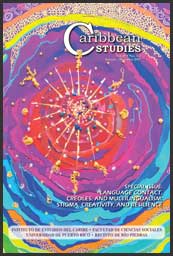Abstract
This paper describes lexical phenomena in Palenquero, particularly concerning the following words: ajeno 'poor,‘ 'alien,‘ kamino mí/sí/ele 'quietly,‘ alasonga~lasónga 'unconcernedly,‘ maloko 'Wow!,‘ añú 'ouch!,‘ eleeló 'How sad!,‘ and kurremplemplem 'be careful,‘ among others. These words exhibit idiosyncratic features regarding their prosodic structure, morphology, function, meaning, language use, and cultural content. Given that there are few studies of these lexemes, this paper analyses the type of speech acts in which these are used, as well as the semantic, pragmatic, morphological, syntactic rules, and cultural aims underlying their use; for example, the adjective ajeno exhibits no gender distinctions in noun phrases with a noun inflected for masculine gender. On the other hand, a unit such as kamino mí, sí, ele agrees with the sentential subject. Additionally, forms such as eleeeló, añú, maloko, kurremplemplem, and alasonga~lasónga show variation in vowel phonemes and partial reduplication as well. Syntactically, these units have different functions and meaning depending on their position. These features place some of these forms among the class of ideophones.Downloads
Download data is not yet available.

